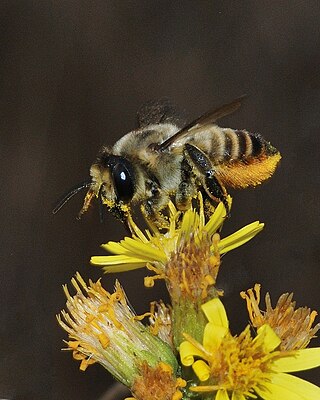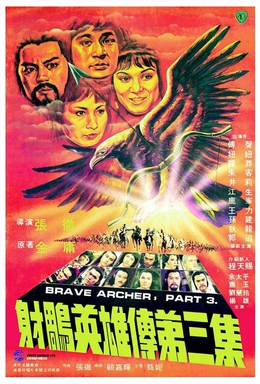
Wang Shuang, courtesy name Ziquan, was a military officer of the state of Cao Wei during the Three Kingdoms period of China. He initially participated in battles against Wei's rival state Eastern Wu but was defeated and captured. Later, he rejoined Wei and was reassigned to the western front to fight against Wei's other rival state, Shu Han. He was killed in battle against Shu forces.

The genus Megachile is a cosmopolitan group of solitary bees, often called leafcutter bees or leafcutting bees; it also includes the called resin bees and mortar bees. While other genera within the family Megachilidae may chew leaves or petals into fragments to build their nests, certain species within Megachile neatly cut pieces of leaves or petals, hence their common name. This is one of the largest genera of bees, with more than 1500 species in over 50 subgenera. The alfalfa leafcutter bee is managed on a commercial scale for crop pollination, and has been introduced by humans to various regions around the world.
Sinocyclocheilus is a genus of freshwater fish in the family Cyprinidae endemic to China, only found in Guangxi, Guizhou and Yunnan. Almost all of its species live in or around caves and most of these have adaptions typical of cavefish such as a lack of scales, lack of pigmentation and reduced eyes. Several species have an unusual hunchbacked appearance and some of the cave-dwellers have a "horn" on the back, the function of which is unclear. In contrast, the Sinocyclocheilus species that live aboveground, as well as a few found underground, show no clear cavefish adaptions. They are relatively small fish reaching up to 23 cm (9.1 in) in length. The individual species have small ranges and populations, leading to the status of most of the evaluated species as threatened. Many species populations in the genus have yet to be evaluated by the IUCN.

Triplophysa is a genus of fish in the family Nemacheilidae found mainly in and around the Qinghai-Tibet Plateau in China. Currently, the genus is a mixed assemblage of species. Some lineages have been identified and treated as subgenera, but as Wikipedia follows Fishbase for fish species all but Hedinichthys have been treated as subgenera in Wikipedia, although Kottelat in his revision of the loaches did recognise them as valid. FishBase, however, includes these in Triplophysa without specifying subgenera and treats the names given by Kottelat as synonyms.
Zhu Kerong, formally the Prince of Wuxing (吳興王), was a military governor (Jiedushi) of the Chinese dynasty Tang Dynasty who ruled Lulong Circuit independent of the imperial authority during the reigns of Emperor Muzong and Emperor Jingzong, until he and his son Zhu Yanling (朱延齡) were killed by their own soldiers in 826.
The Niu–Li factional strife was an ongoing contention at the court of the mid-to late Tang dynasty. It is largely viewed to have started during the reign of Emperor Muzong, circa 821, but having its seeds in the events of his father Emperor Xianzong—between two court factions later to be referred to by Chinese historians as the Niu Faction (牛黨), named after Niu Sengru, which was largely viewed as a faction of officials from humble origins and who passed the imperial examinations to get into government; and the Li Faction (李黨), named after Li Deyu, which was largely viewed as a faction of officials from aristocratic origins. The two factions struggled for decades at court, during the reigns of Emperor Muzong and his sons Emperor Jingzong, Emperor Wenzong, and Emperor Wuzong. The struggles are viewed as having ended at the start of the reign of Emperor Wuzong's successor and Emperor Muzong's younger brother Emperor Xuānzong, in 846. Emperor Xuanzong despised Li Deyu and systematically demoted officials related to Li Deyu, leading to the complete defeat of the Li Faction.

The Water Margin is a 1998 Chinese television series adapted from Shi Nai'an's classical 14th-century novel of the same title. It was produced by CCTV with Zhang Jizhong as producer. It was first broadcast in China in January 1998. The series also featured action choreography by Yuen Woo-ping.

The Brave Archer 3, also known as Blast of the Iron Palm, is a 1981 Hong Kong film adapted from Louis Cha's novel The Legend of the Condor Heroes. The film was produced by the Shaw Brothers Studio and directed by Chang Cheh, starring Alexander Fu Sheng and Niu-niu in the lead roles. The film is the third part of a trilogy and was preceded by The Brave Archer (1977) and The Brave Archer 2 (1978). The film has two unofficial sequels, The Brave Archer and His Mate (1982) and Little Dragon Maiden (1983), both of which were based on The Return of the Condor Heroes. The theme song of the film, Say Cheung Kei (四張機), was composed by Chang Cheh, arranged by Joseph Koo and performed in Cantonese by Jenny Tseng.
Zhu Jin (朱瑾) (867-918) was a warlord late in the Chinese Tang Dynasty who would later be a major general of the Wu state during the subsequent Five Dynasties and Ten Kingdoms period. In the late Tang years, Zhu Jin, as the military governor (Jiedushi) of Taining Circuit would form a power bloc with his cousin Zhu Xuan the military governor of Tianping Circuit, but they were both eventually defeated by Zhu Quanzhong the military governor of Xuanwu Circuit. Zhu Xuan was killed, and Zhu Jin fled to the domain of Yang Xingmi the military governor of Huainan Circuit ; he would thereafter serve under Yang and Yang's successors, whose domain formed the Wu state eventually. In 918, angry at the arrogance of the Wu junior regent Xu Zhixun, he assassinated Xu Zhixun, but Xu Wen's troops attacked him; he committed suicide when he saw that there was no escape.

The Heaven Sword and Dragon Saber is a Taiwanese television series adapted from Louis Cha's novel of the same title. The series was first broadcast on TTV in Taiwan in October 1984.

Tang Ming Huang is a Chinese television series based on historical events in the reign of Emperor Xuanzong of the Tang dynasty. The series was directed by Chen Jialin and starred Liu Wei as the eponymous emperor. It was first broadcast on CCTV-1 in 1990 in mainland China.
Wu Cheng'en and Journey to the West is a Chinese television series about the life of Wu Cheng'en and his inspiration for writing the 16th-century novel Journey to the West. The series was directed by Kan Weiping and consists of a total of 45 episodes shot in high definition, each 45 minutes long and containing 10 minutes of 3-D effects. The original lead actors of the 1986 television series Journey to the West starred in Wu Cheng'en and Journey to the West and reprised their roles: Liu Xiao Ling Tong as Sun Wukong, Chi Chongrui as Tang Sanzang and Ma Dehua as Zhu Bajie. Sha Wujing, however, was portrayed by Liu Dagang because the original actor, Yan Huaili, died in April 2009. It was broadcast by Shandong Qilu TV in July 2010.

Heroes in Sui and Tang Dynasties is a Chinese television series based on Chu Renhuo's historical novel Sui Tang Yanyi, which romanticises the historical events leading to the fall of the Sui dynasty and the rise of the Tang dynasty. The series was first broadcast in mainland China on various television networks on 14 January 2013. It is not to be confused with Heroes of Sui and Tang Dynasties 1 & 2, a similar television series also based on the novel, but was released earlier in December 2012. Filming for the series started on 5 November 2011 at the Hengdian World Studios and wrapped up in May 2012.

The Romance of the Condor Heroes is a 2014–15 Chinese television series produced by Yu Zheng and adapted from Jin Yong's novel The Return of the Condor Heroes, with additional material from the preceding novel, The Legend of the Condor Heroes. It stars Chen Xiao and Michelle Chen in the lead roles. The series was first broadcast on Hunan TV from 3 December 2014 to 11 March 2015.
The following lists events from 1995 in China.

Sunny Piggy is a 2000 Chinese romantic fantasy comedy-drama television series. It stars Xu Zheng as Zhu Bajie, a foolish pig who wanted to become human, and Tao Hong as a kindhearted dragon princess who loved him unconditionally until her death. Most characters, including Zhu Bajie, are taken from the 16th-century novel Journey to the West and Chinese mythology.
Treasure Venture (侠女闯天关) is a comedy TV series which was produced in mainland China and Taiwan in 2000. It starred Zhao Wei and Nicky Wu.

Taiwanofungus is a fungal genus of unknown familial placement in the order Polyporales. The genus contains two species: the type, Taiwanofungus camphoratus, and T. salmoneus. Taiwanofungus was circumscribed by Chinese mycologists in 2004. T. camphoratus is a medicinal fungus that is found in Taiwan, where it grows on the endemic tree species Cinnamomum kanehirae. It was first described in 1990 by Mu Zang and Ching-Hua Su as a species of Ganoderma. T. salmoneus, originally placed in Antrodia, was validly added to the genus in 2012.

Acnemia is a genus of fly belonging to the family Mycetophilidae.

Pseudoanthidium is a genus of bees belonging to the family Megachilidae. The species of this genus are found in Eurasia, Africa and Australia.












